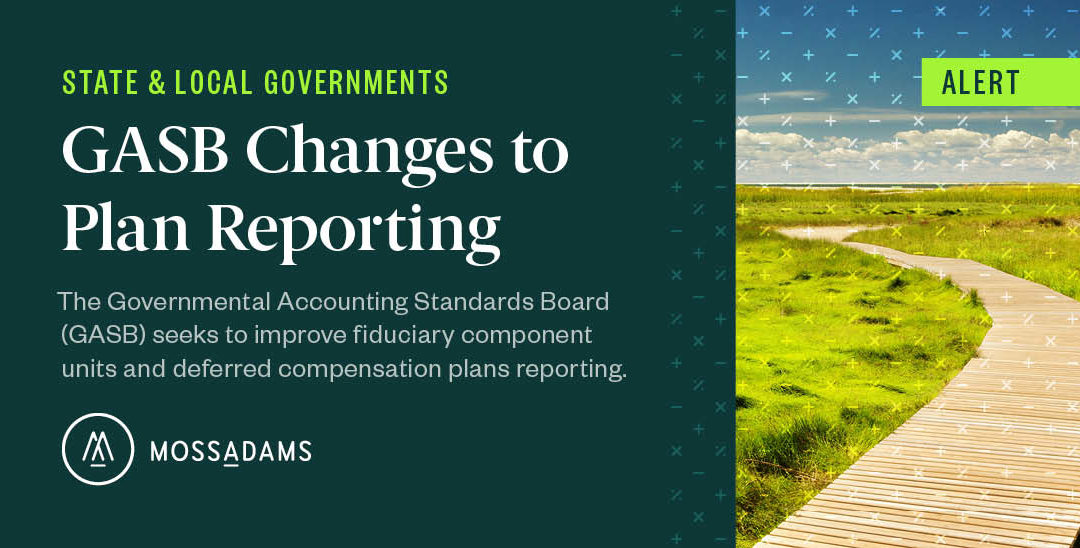This article, "GASB Issues Changes to Plan Reporting," originally appeared on MossAdams.com.
The Governmental Accounting Standards Board (GASB) issued Statement No. 97, Certain Component Unit Criteria, and Accounting and Financial Reporting for Internal Revenue Code Section 457 Deferred Compensation Plans, on June 23, 2020.
The new guidance is intended to:
- Improve the consistency of the reporting of fiduciary component units
- Enhance the comparability in the application of accounting and financial reporting requirements for deferred compensation plans
This new guidance, and the existing guidance related to fiduciary component units and fiduciary activities contained in Statement No. 84, Fiduciary Activities, must be considered carefully.
Key Provisions
The statement is intended to increase the comparability of the reporting of fiduciary component units in circumstances where a potential component unit doesn’t have a governing board.
The statement also intends to mitigate financial reporting costs associated with certain defined contribution pension plans, defined contribution other postemployment benefit (OPEB) plans, and other employee benefit plans, by clarifying the financial burden criteria in Statement No. 84, Fiduciary Activities.
Lastly, the statement extends the accounting and financial reporting requirements related to pension plans, to Section 457 plans that meet the definition of a pension plan.
Component Unit Scope Exception
For defined contribution pension plans, defined contribution OPEB plans, and other employee benefit plans, the statement provides a narrow scope exception from component unit criteria related to financial accountability. When it’s determined the primary government isn’t performing the duties of the governing board, and when there’s an absence of a governing board, the exception is applicable
Additionally, the statement revises the applicability of the financial burden criterion—as it relates to contributions made by the primary government—to contributions made only to defined benefit pension plans and defined benefit OPEB plans.
For more information on the amendments to the component unit criterion, please see GASB Aims to Mitigate Costs of Fiduciary Activities Standard.
Deferred Compensation Plans
Historically, Section 457 plans were viewed as more similar to tax-deferred employee savings plans than pension plans. Changes to the characteristics of certain Section 457 plans resulted in the GASB reassessing the treatment of Section 457 plans.
Under the new guidance, a Section 457 plan should be classified as either a pension plan or other employee benefit plan as follows:
- A Section 457 plan that meets the definition of a pension plan in accordance with Statement No. 67 or Statement No. 73, Accounting and Financial Reporting for Pensions and Related Assets That Are Not within the Scope of GASB Statement 68, and Amendments to Certain Provisions of GASB Statements 67 and 68, is to be treated as a pension plan for accounting and financial reporting purposes.
- A Section 457 plan that doesn’t meet the definition of a pension plan is another employee benefit plan for accounting and financial reporting purposes.
Statement No. 67 and No. 73 outline the definition of a pension plan through arrangements which pensions are determined, how assets dedicated for pensions are accumulated and managed, and how benefits are paid as they come due.
Upon making the determination if the Section 457 plan is a pension plan or other employee benefit plan, the statement then requires that Statement 84, as amended, be applied in determining whether the Section 457 plan should be reported as fiduciary activities.
The statement further clarifies all accounting and financial reporting requirements that are relevant to pension plans should be applied to a Section 457 plan that meets the definition of a pension plan.
The statement supersedes the remaining provisions regarding investment valuation requirements for Section 457 plans in Statement No. 32, Accounting and Financial Reporting for Internal Revenue Code Section 457 Deferred Compensation Plans, as amended. As a result, the new guidance requires investments of all Section 457 plans to be measured as of the end of the plan’s reporting period.
These changes are effective for fiscal years beginning after June 15, 2021. Earlier application is encouraged.
We’re Here to Help
For more information on how the changes may affect your organization, please contact your Moss Adams professional.


